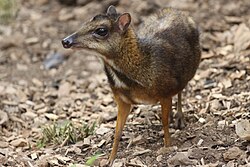The Java mouse-deer (Tragulus javanicus),[2] is a species of even-toed ungulate in the Tragulidae family. At maturity it is about the size of a rabbit, making it one of the smallest ungulates. It is found in forests in Java and perhaps Bali.[1] It formerly included the more widespread T. kanchil and the poorly known T. williamsoni as a subspecies.[3]
| Java Mouse-deer | |
|---|---|

| |
| Java mouse-deer at the Jerusalem Zoo | |
| Scientific classification | |
| Kingdom: | |
| Phylum: | |
| Class: | |
| Order: | |
| Family: | |
| Genus: | |
| Species: | T. javanicus
|
| Binomial name | |
| Tragulus javanicus (Osbeck, 1765)
| |
Taxonomy
The Java mouse-deer’s common scientific name is Tragulus javanicus, although other classification names for it exist, including Tragulus javanica, Cervus javanicus, and Tragulus fuscatus (4). The Java mouse-deer is also known by many common names, including Javan chevrotain, Javan mousdeer, or Java Mousedeer (5). The taxonomic status of the Java mouse-deer is questionable, but recent craniometric analyses have begun to shed light on the taxonomic discrepancies. Previously, the Java mouse-deer, Tragulus javanicus, was commonly thought to represent the wider class of large chevrotains, but it was found that these, unlike the Java mouse-deer, do not likely reside on Java. Three species groups of Tragulus have been identified based on craniometric skull analyses and coat coloration patterns. These three species groups are Tragulus javanicus, Tragulus napu, and Tragulus versicolor. Based upon these craniometric analyses, Tragulus javanicus is further separated based on the organisms’ known geographic locations: Tragulus williamsoni (found in northern Thailand and possibly southern China), Tragulus kanchil (found in Borneo, Sumatra, the Thai–Malay Peninsula, islands within the Greater Sunda region, and continental Southeast Asia), and Tragulus javanicus (found in Java) (6). Thus, because of its uniqueness to the island of Java, the Java mouse-deer is now considered a distinct species, although this fact has not significantly affected its current classification (7).
Appearance and Biology
Ecology
Geographic Range
Habitat
Behavior
Diet
Social Behaviors
Reproduction & Young
Predators
Diseases
Conservation Status
Importance in Indonesian folklore
References
- ^ a b Template:IUCN2008 Database entry includes a brief justification of why this species is of data deficient.
- ^ "Tragulus javanicus". Mammal Species of the World. Retrieved 2010-03-11.
- ^ Meijaard, I. and Groves, C. P. (2004). A taxonomic revision of the Tragulus mouse-deer. Zoological Journal of the Linnean Society 140: 63-102.
